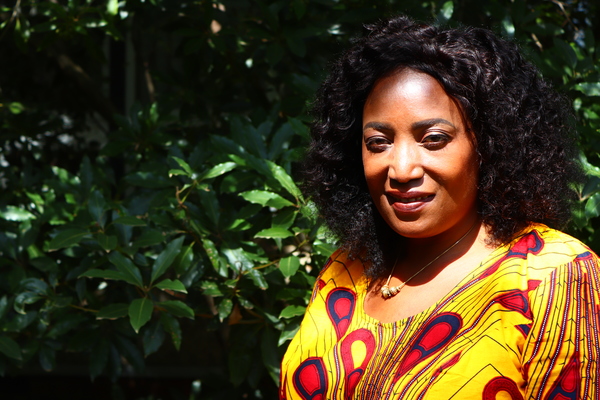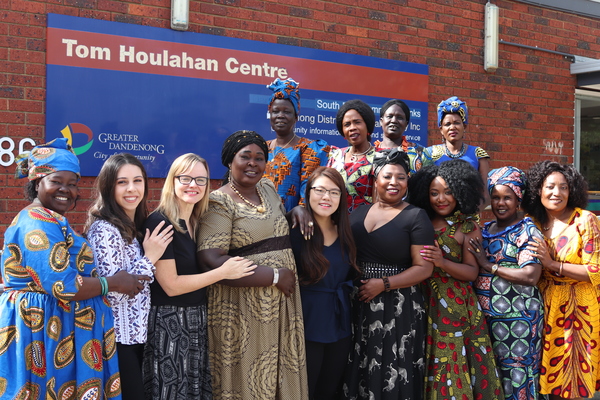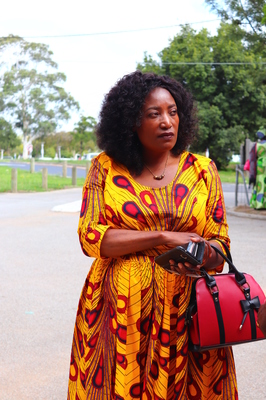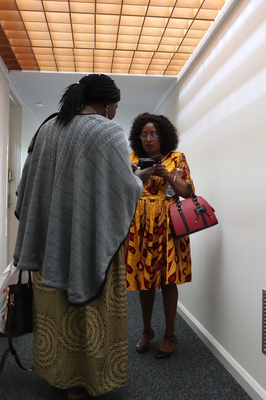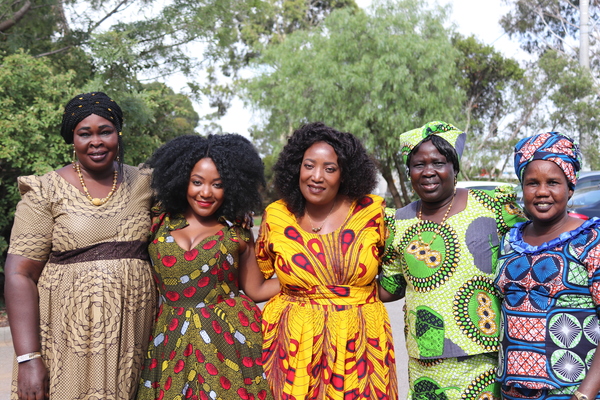A traumatic past has led to a brighter future for Selba Gondoza Luka, CEO and Founder of Afri-Aus Care Inc. – and not just for herself, but for African-Australian youth and their families across Cardinia, Casey and Dandenong, as DANIELLE KUTCHEL discovered.
“People need to be patient with new migrants, and work with them – they will discover that the South Sudanese have a lot to offer to our great country Australia.“
Selba Luka is living proof of the power of using the Positive Change Model and having a belief and faith.
It was faith in God that helped her get through some of her darkest days, rising to become a respected community leader and mother figure to the many underprivileged African-Australian youth across Cardinia, Casey and Greater Dandenong councils.
Ms Luka, CEO and founder of Afri-Aus Care, is now using a similar technique to bridge the gap between African-Australians and the wider Australian community. She founded Afri-Aus Care based on her own experiences of family violence, intergenerational conflict with her daughter, the passing away of her baby and complications of living with unresolved trauma.
An abusive relationship threatened to break her life through suicide attempts. For years, Ms Luka was told by her ex-husband she was “nothing” and that “there were more powerful women out there compared to what I was then”. Eventually, her husband left her for a younger woman – but the damage had already been done, in a trend that’s common to many African-Australian women.
Ms Luka’s relationship with her daughter, Kwacha, had been cracked and worsened by family violence, and she was left with depression and anxiety. She even required psychiatric treatment. But even in her darkest hours, there were people who believed in Ms Luka and it was the faith they had in her that helped pull her through.
“The people who supported me did not see the mental illness; they were not judgemental, but instead they saw the potential in me and the faith that I had in God,” she said.
She “came out of the woods”, mended her relationship with her daughter, and with support from others and using her own money, established Afri-Aus Care in 2015. Working on a voluntary basis, Ms Luka hired other volunteers too.
She is now a qualified mental health clinician, specialising in at-risk youth within the African, culturally-and-linguistically-diverse (CALD) communities.
“Without the experience I went through with my daughter, I wouldn’t be doing this; I wouldn’t have learned how to work with young people,” she explained.
“Kwacha is a good helper, a good mentor. She understands the young people and she encouraged me to reach out to young people who are helpless and have no one to understand what they are going through.”
From humble beginnings, Afri-Aus Care has now become a group of professionals who provide holistic health and wellbeing support services using the concept of Ubuntu, assisting African-Australian youth, their families and those from other CALD backgrounds. They use the Positive Change Model by targeting those who are experiencing unresolved trauma like mental health issues, family conflict, or who are (or are at risk of getting) in contact with the justice system due to the offences arising from these circumstances.
Afri-Aus Care is building a future where services will acknowledge and be sensitive to African and diverse CALD people´s perception of mental health. By recognising cultural differences, they aim to increase social participation and reduce isolation within the south east Melbourne region.
Since 2015, Afri-Aus Care has been working closely with South Sudanese community groups and leaders. They have received funding from local, state and federal governments. They have also received assistance from a number of private and church organisations including ADRA Victoria, under the Settle Assist program, and are grateful to those who have contributed to where the organisation is now.
The Federal Government, under its MUSTER project funding which provides grants for projects to build community resilience and increase the ability of communities to connect, contribute and thrive, has made it possible for Afri-Aus Care to operate across Cardinia, Casey and Greater Dandenong city councils.
Among the programs offered are social sports as part of the Black Rhinos basketball teams funded by DPC. The Black Rhinos team has grown to a number of teams now operating in three different areas in Dandenong and Chadstone. In addition, a community outreach program at Fountain Gate has been operated by African community leaders, volunteers of Afri-Aus Care and community leaders from the South Pacific.
Employment has been an issue for young African-Australians and their families. Funding from Jobs Victoria has produced a lot of real employment pathways for young people. Now, Afri-Aus Care’s youth employment program has seen over 25 young people placed in stable employment. Through the MUSTER project, they have connected older African-Australians into real jobs. With offices across Cardinia, Casey and Greater Dandenong, Afri-Aus Care plans to open a new centre closer to the city to train young people for white collar jobs. What they desperately need now is a larger office from which to operate in Dandenong, Ms Luka said.
She said that all the programs, including culturally specific mental health and wellbeing assessments, counselling and referrals, drug, alcohol, legal and youth support, men’s and women’s programs, gardening, sewing and alternative education pathways, have so far yielded strong results.
The organisation also provides culturally-specific counselling to young people who are referred from the justice system.
“We use pre-habilitation for most of our African-Australian youth who are going through difficult times and the results have been great,” Ms Luka said.
“We encourage young people to listen to their parents. No parent advises a child to go and steal or to get involved in anti-social behaviour! But when they feel misunderstood at home, they look for something else, and they find it on the streets. This can result in unresolved trauma, leading to the problems we see in our young people today,” she added.
But Ms Luka said many of those using Afri-Aus Care’s services reach out of their own accord, because they are seeking help. And help is what they find, no matter what time of the day or night it might be.
Ms Luka said healing came from assisting those who are going through unresolved trauma, similar to what had happened to her in the past.
“I can feel the high need in the community, especially the African-Australian single women who are left with their children in their care with minimal financial support. I understand, because I have been there. I went through the same as what they’re going through. Unless people put themselves in their shoes, they will never understand what these women are going through,” she said.
“The establishment of our African-Australian Health and Wellbeing Groups, both for men and women, has changed many lives.
“We help people during the day and after hours, seven days a week. Even at 4am, young people have called.”
She is positive about the future for the South Sudanese community in Melbourne, and hopes that they will be welcomed by the wider community.
“People need to be patient with new migrants, and work with them – they will discover that the South Sudanese have a lot to offer to our great country Australia.
“Already, there are young South Sudanese who are becoming doctors, lawyers or in the positions of high offices in both Government and private sectors.
“Some have very successful businesses. We don’t hear much about positive stories – it’s time to work closely with them.
“Unfortunately, some people focus on the negative behaviour of South Sudanese people. But if we can focus on the positive things which South Sudanese people are doing and invest in helping those who are falling through the cracks, I don’t think the general community will think badly about Sudanese people,” she said.
Ms Luka believes in empowering youth and their families, regardless of what stage they are at in speaking and writing English, through giving them opportunities to step into the workforce.
She commented: “If people can’t be employed, they lose their skills and confidence. I am living proof – from being a cleaner in a hotel to now being the CEO and founder of Afri-Aus Care, a culturally specific organisation which is making a positive impact in the south eastern region of metropolitan Melbourne.”

